 |
| Fr. Lothar Konig, S.J. |
 |
| Fr. Alfred Delp, S.J. |
The Kreisau Circle was a loose association of
aristocrats, civil servants, clergy, and
Social Democrats who gathered in small, secret meetings to plan a post-Nazi constitutional government, one based on Christian social-justice principles. Rosch, as Jesuit provincial, had been invited to help link the group with the Catholic bishops. He brought with him
Lothar Konig and
Alfred Delp. In the mid-1930s, Rosch had been catapulted from his position as rector of a boys school in Austria to superior of the
Jesuits' South German province. He immediately distinguished himself as an outstanding administrator, and soon gained the confidence of the German bishops. Rosch had contacts in Rome at the highest levels, including the Jesuit superior general and
Robert Leiber, a German Jesuit who served as secretary to
Pope Pius XII Rosch corresponded regularly with them, giving details of the plight of harassed and imprisoned, treatment of Russian prisoners of war prisoners of war, in international law, persons captured by a belligerent while fighting in the military. International law includes rules on the treatment of prisoners of war but extends protection only to combatants. In one letter he described Germany's situation as
"the apocalypse of the twentieth century." Unlike Rosch, whose leadership position and combative personality had led to frequent run-ins with the
Gestapo, Konig pursued his underground work behind an imperturbable facade. Placed in charge of the house of studies known as
Berchmanskolleg, he had managed to wrest the building from the SS, which had requisitioned it, by offering it to the
Wehrmacht as a military base and hospital. The army's special communications system proved useful, and working quietly in the background, Konig was able to keep the country's bishops informed about events elsewhere. He would move about in cloak-and-dagger fashion, sometimes appearing from nowhere on a bishop's doorstep, bringing the latest news, and encouraging the hierarchy in its struggles with the Nazis. He produced a list of the dead from the nearby
Dachau concentration camp (some said he had coaxed a cleaning woman into letting him into the room where the camp's records were kept), as well as a text describing conditions at the camp. He sent these documents to Rome.
Link (here) to the complete and riveting article.













1 comment:
The German resistance to Hitler is a story that deserves to be better known, and the Catholic participation in that resistance also needs to be better known.
Thanks for posting this.
Post a Comment